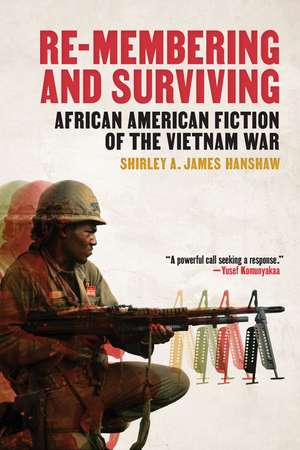Re-Membering and Surviving: African American Fiction of the Vietnam War
Autor Shirley A. James Hanshawen Limba Engleză Paperback – 31 oct 2020
Preț: 297.41 lei
Nou
Puncte Express: 446
Preț estimativ în valută:
56.92€ • 59.20$ • 46.99£
56.92€ • 59.20$ • 46.99£
Carte tipărită la comandă
Livrare economică 14-28 aprilie
Preluare comenzi: 021 569.72.76
Specificații
ISBN-13: 9781611863710
ISBN-10: 1611863716
Pagini: 324
Dimensiuni: 152 x 229 x 23 mm
Greutate: 0.41 kg
Ediția:1
Editura: Michigan State University Press
Colecția Michigan State University Press
ISBN-10: 1611863716
Pagini: 324
Dimensiuni: 152 x 229 x 23 mm
Greutate: 0.41 kg
Ediția:1
Editura: Michigan State University Press
Colecția Michigan State University Press
Recenzii
“This superb analytical voice examines literature by four black writers—John A. Williams, Wesley Brown, A. R. Flowers, and George Davis—who are masterful storytellers shaped in the caldron of war. Through her attention to these figures, Hanshaw reveals an American voice that has been kept in obscurity. Here, the historical background illuminates a postmodern imagination.”
—YUSEF KOMUNYAKAA, winner of the 1994 Pulitzer Prize for Poetry and the Kingsley Tufts Poetry Award for Neon Vernacular: New and Selected Poems
—YUSEF KOMUNYAKAA, winner of the 1994 Pulitzer Prize for Poetry and the Kingsley Tufts Poetry Award for Neon Vernacular: New and Selected Poems
Notă biografică
SHIRLEY A. JAMES HANSHAW is Professor Emerita in the English Department at Mississippi State University where she was instrumental in establishing the first African American Studies Program. She is the recipient of a Woodrow Wilson Fellowship, a Danforth Associateship for Outstanding Teaching in the Sciences and Humanities, and a National Endowment for the Humanities Fellowship.
Descriere
The first book-length critical study of the black experience in the Vietnam War and its aftermath, this text interrogates the meaning of heroism based on models from African and African American expressive culture. It focuses on four novels: Captain Blackman (1972) by John A. Williams, Tragic Magic (1978) by Wesley Brown, Coming Home (1971) by George Davis, and De Mojo Blues (1985) by A. R. Flowers. The success or failure of the hero on his identity quest is predicated upon the extent to which he can reconnect with African or African American cultural memory. He is engaged therefore in “re-membering,” a term laden with the specificity of race that implies a cultural history comprised of African retentions and an interdependent relationship with the community for survival.
